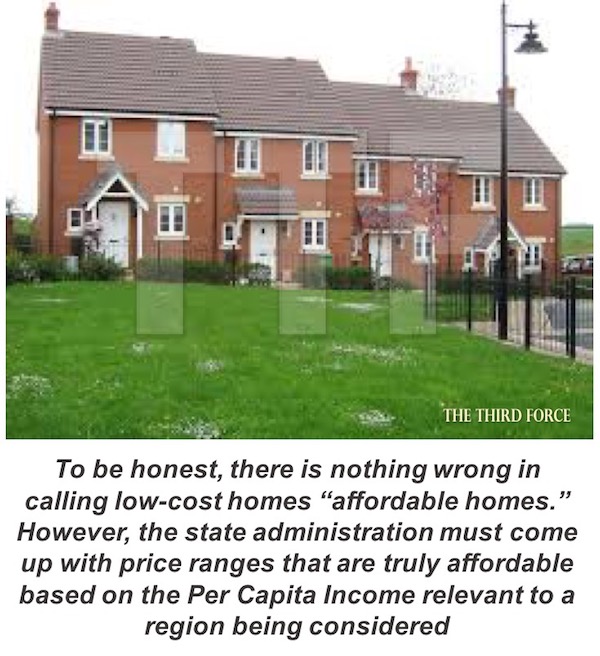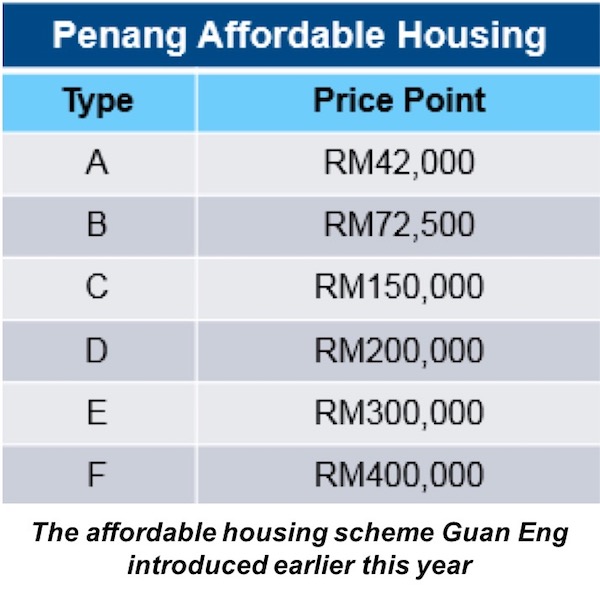TTF: Penang State Local Government and Housing Committee chairman Jagdeep Singh Deo said today that Penang was sidelined by the the previous Barisan Nasional regime for the past 10 years (see news item below).
According to him, Penang had not benefited from the federal-initiated affordable housing programmes in the past decade and built 28,195 units of low-cost, low-medium-cost and affordable housing on its own initiative.
To Jagdeep, I have this to say – if you want to tell lies, learn how to tell them properly.
On the 11th of November 2017, I posted an article that read as follows:
Certain parties have been trying to blame the Federal Govt for not giving them the RM150mil in funds for the Sg. Pinang flood mitigation project.
Here are the facts:
1) This RM150mil amount, which is part of a bigger project, were promised to the Penang Govt in 2008 is conditional on the Penang Govt doing their part by clearing the riverbanks of squatters.
River-widening projects cannot start if squatters are on the river banks.
The Penang Govt only managed to deliver their end of the bargain after March 2016 – hence qualifying for the funds in the next budget.
““The arrangement with the federal government was the Penang state government will clear the squatters who live along the Sungai Pinang which runs through the area and provide them housing. Meanwhile, the federal government will allocate money for the river widening under the flood mitigation project. Now, the state has almost cleared all the squatters and yet, the allocation has not been approved,” Jagdeep said at a press conference on 2nd March 2016 at Jalan P. Ramlee.
https://www.buletinmutiara.com/putrajaya-asked-to-keep-flo…/
Thus any delay at this stage was due to the Penang Govt.
This, the Federal Govt then kept their part of the bargain when Federal Minister Wan Junaidi announced the RM150mil allocation for the year 2017 on 8 Nov 2016:
http://www.themalaymailonline.com/…/federal-govt-to-give-pe…
2) Although the funds have now been allocated, the delay in actually spending the money in 2017 was not due to Federal Govt.
“Penang’s planned flood mitigation projects can only start towards the end of 2017, and will take up to three years’ to complete, Penang EXCO in charge of flood mitigation Chow Kon Yeow said in April 2017.
Chow said this was because the relevant tender process and other studies needed to be carried out first.
http://www.freemalaysiatoday.com/…/tender-process-blamed-f…/
Thus any delay up to this stage is again due to the Penang Govt and their strange habit of “studies” being habitually late to complete.
Then, on the 22nd of October 2017, I wrote:
On the 19th of January 2017, Jagdeep Singh Deo announced the state government’s decision to ‘rebrand’ low and medium-cost houses as “affordable homes.” With the rebranding, houses costing RM42,000 each are now referred to as “affordable housing type A” (or AHTA), while medium-cost houses priced at RM72,000 are known as “affordable housing type B” (or AHTB). So you see, the term “low-cost” no longer exists in Guan Eng’s textbooks.

But the Guan Eng administration did none of that. Still, Jagdeep seemed to have a good reason why the state resorted to calling low-cost homes “affordable homes.” According to him, the term “low-cost” had a “very negative connotation” to it and would bring undue “stigma to the purchasers of such units.” He told newsmen that it would be improper to burden purchasers with such a stigma as they would “inevitably be first-time house buyers.”
Now, the impression given by Jagdeep was that the state administration did not discriminate against people from the lower income segment. He implied that these people would be able to purchase low-cost homes on the island owing to the state government’s caring attitude and commitment towards the welfare of all Penangites.
Well, let’s see.
Currently, there are several housing projects on the island that are either underway, about to commence or were recently completed. The Guan Eng administration is responsible for five of those projects (hereinafter referred to as “LGE Island Projects”), while a remaining 34 or so (hereinafter referred to as “Private Island Projects”) are associated with cash-rich developers, the likes of Hunza Group (Hunza) and companies linked one way or the other to Tan Sri Tan Kok Ping and the founder of Hunza himself, Dato’ Seri Khor Teng Tong.
Now, none of the LGE Island Projects and Private Island Projects involve the construction of AHTA. However, these projects – virtually all of them – are listed as affordable projects or schemes, meaning, they either have affordable units or are made up entirely of AHTA and AHTB. But a quick check into some price listings told a very, very different story.
To illustrate this point, I refer you to a housing project by Visa Fleet Sdn Bhd (Visa Fleet) at Sungai Nibong, which listed all 67 units being built as “affordable.” However, the indicative price of each “affordable” unit was nothing less than RM300,000, which, if you ask me, is neither affordable nor within range of prices associated with AHTA and AHTB schemes. Question is, did Visa Fleet err with its listing?
Apparently not.
The reason being, Guan Eng instructed Jagdeep to bundle together four other price categories within the so-called “affordable homes” scheme (below) and have them labeled types C to F. The new scheme allowed the state administration to sell homes at prices close to half a million and get off scot free by simply declaring them “affordable.”

Now do you understand the ‘rationale’ behind the state government’s ‘rebranding’ of low and middle-cost homes?
So you see Jagdeep, before you decide to open your mouth wide and demonise the previous Barisan Nasional regime, reflect on your own shortcomings first and understand how you yourself used to confuse the federal government and the people on account of your boss, Lim Guan Eng.
GEORGE TOWN: Claiming that it had been sidelined for the past 10 years by the previous Barisan Nasional regime, Penang wants the 2019 Budget, which will be tabled tomorrow, to give utmost priority to the state.
State Local Government and Housing Committee chairman Jagdeep Singh Deo said priority should be given particularly in the aspect of housing.
He said Penang had not benefited from the federal-initiated affordable housing programmes in the past decade.
“The previous federal BN regime had failed to deliver a single unit of the 1Malaysia People’s Home (PR1MA) and the 1Malaysia Civil Servant Housing Scheme (PPA1M) projects in the state.
“As such, we hope that our wish list will receive a favourable response tomorrow, when the first Pakatan Harapan federal Budget is tabled,” he told newsmen.
The Penang government had, in the past 10 years, on its own initiative, built 28,195 units of low-cost, low-medium-cost and affordable housing.
A further 22,065 units are in various stages of being built and a further 33,212 units have been approved to be built.
Jagdeep also called for more Peoples Housing Projects (PPR) to be built in the state.
He said the state received the least number of PPR units, at 999 units, from the 110,000 units available nationwide.
Jagdeep said the new budget should also have a policy call for cheaper houses nationwide.
“Where this is concerned, having regard to the abolition of the Goods and Services Tax (GST) and its replacement with Sales and Service Tax (SST) which does not apply to construction materials, it is hoped that the budget will also make a commitment that will ensure developers reduce the price of all types of housing.
“Similarly, the policy should also address the high loan rejection rate, particularly for first time affordable home buyers.
“Penang has consistently lobbied Bank Negara Malaysia and all stakeholders to review its stringent policies where first time affordable home buyers are concerned in their loan application,” he added, noting that among the measures proposed:
* the extension of loan repayment term to more than 30 years and the extension to second generation;
* more flexible loans in terms of percentage allowed, for example more than the maximum of 90 per cent;
* a reduction of interest rates for affordable housing;
* introduction of rent to own schemes with banks collecting rental for the first five gears which can be converted to the deposit payment at the end of the said period; and,
* tiered loan repayment, for example starting at a lower sum which can be gradually increased.
Source: NST Online




